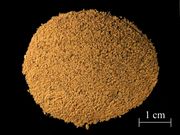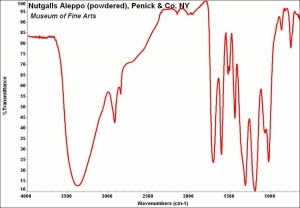Difference between revisions of "Gall"
| Line 6: | Line 6: | ||
[[[SliderGallery rightalign|NutgallsAleppoMFAIR.jpg~FTIR]]] | [[[SliderGallery rightalign|NutgallsAleppoMFAIR.jpg~FTIR]]] | ||
| + | See also Uemura Dye Archive [http://cameo.mfa.org/wiki/Gobaishi_(Chinese_sumac)_-_left_(68_L) Gobaishi] | ||
== Synonyms and Related Terms == | == Synonyms and Related Terms == | ||
Latest revision as of 07:46, 12 August 2020
Description
An abnormal growth on trees, usually oaks (Quercus infectoria) in Europe and the Near East and on sumacs (Rhus semialata) in China and Japan. Galls are formed when gall-wasp eggs are deposited on tree branches. The nutlike gall grows until the larvae are completely enveloped. The mature insect bores a hole through the gall in order to escape. Bluish-green galls, gathered before the insect escapes, are richest in gallotannic acid, though all galls contain 36-60% tannins. The tannins have been used for centuries for vegetable tanning of Leather. When galls are combined with Ferrous sulfate, a black dye is produced; alone, they produce a gray dye. Gall extract was also used as a Mordant in the preparation of writing inks.
See also Uemura Dye Archive Gobaishi
Synonyms and Related Terms
galls (pl.); Gallapfel (Deut.); agallas (Esp.); noix de galle (Fr.); galla (It.); galappel (Ned.); noz de galha (Port.); nutgalls; gallnuts; noix de galle; oak apples; oak gall nuts; huur nuts; tamarisk gallo; pistacia gall; aleppo gall; Chinese gall; gall-nuts
Additional Images
Dyed with gall from Chinese sumac [1]
Resources and Citations
- Ralph Mayer, A Dictionary of Art Terms and Techniques, Harper and Row Publishers, New York, 1969 (also 1945 printing)
- Hermann Kuhn, Conservation and Restoration of Works of Art and Antiquities, Butterworths, London, 1986
- Matt Roberts, Don Etherington, Bookbinding and the Conservation of Books: a Dictionary of Descriptive Terminology, U.S. Government Printing Office, Washington DC, 1982
- Encyclopedia Britannica, http://www.britannica.com Comment: "gall" [Accessed October 9, 2001]. (picture)
- F. Crace-Calvert, Dyeing and Calico Printing, Palmer & Howe, London, 1876
- Judith Hofenk-de Graaff, Natural Dyestuffs: Origin, Chemical Constitution, Identification, Central Research Laboratory for Objects of Art and Science, Amsterdam, 1969
- J. Thornton, 'The Use of Dyes and Colored Varnishes in Wood Polychromy', Painted Wood: History and Conservation, The Getty Conservation Institute, Los Angeles, 1998









